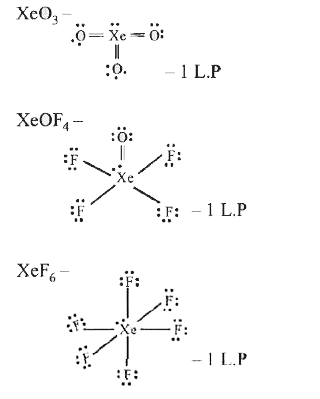Out of (i) XeO3(ii)XeOF4and(iii)XeF6 the molecules having same number of lone pairs on Xe are
(i) and (ii) only
(i)and (iii) only
(ii) and (iii) only
(i),(ii) and (iii)
The correct Answer is:D
Topper's Solved these Questions
Similar Questions
Knowledge Check
Out of (i)XeO3(ii)XeO2F2 and (iii)XeO4, the molecules having same number of lone pairs are
A(i) and (ii)B(ii) and (iii)C(i) and (iii)DNone of theseAmong the following molecules
(i)XeO3(ii)XeOF4(iii)XeF6
those having same number of lone pairs on Xe areA(i) and (ii) onlyB(i) and (iii) onlyC(ii) and (iii) onlyD(i), (ii) and (iii)Among the following molecules
(i)XeO3(ii)XeOF4(iii)XeF6
those having same number of lone pairs on Xe areA(i) and (ii) onlyB(i) and (iii) onlyC(ii) and (iii) onlyD(i), (ii) and (iii)
Among the following molecules
(i) XeO3 (ii)XeOF4 (iii)XeF6
Those having same number of lone pairs on Xe are
View SolutionThe approximate shape of a molecule can often be predicted by using what is called the valence-shell electron-pair repulsion (VSEPR) model. Electrons in bonds and in lone pairs can be thought of a ''charge cloud'' that repel one another nad stay as far apart as possible, thus causing molecules to assume specific shapes.
The repulsive interactions of electron pairs decrease in the order:
Lone pair - Lone pair gt Lone pair - Bond pair gt Bond pair - Bond pair
These repulsive effects result in deviations from idealised shapes and alteration in bond angles in molecules.
Among the following molecules.
(P) XeO3 (Q)XeOF4
(R) XeO2F2 (S)XeF5
Those having different molecular geometry but same number of lone pairs on Xe are :
View SolutionIn XeF2,XeF4 and XeF6(g) the number of lone pairs on Xe respectively are :
View SolutionThe ratio of total number of lone pairs in XeF2 and XeF4 are:
View SolutionIn XeF2,XeF4 and XeF6 the number of lone pair of Xe is ______ respectively.
View Solution
